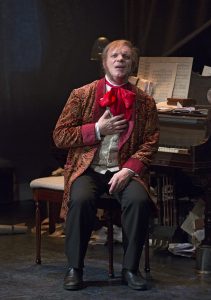My Parsifal Conductor opens October 11,
About three weeks ago, I received an email from Matt Sicoli, a media marketer who is promoting a new, off-Broadway play entitled My Parsifal Conductor, written by the Emmy and Writer’s Guild Winner Allan Leicht. Mr. Sicoli generously offered tickets in exchange for advertising and promotion. I informed him that I am keeping both my Facebook and Patreon sites free of advertising (for now), but that I’d be happy to read the script and, pending an enthusiastic response, write about the play.
I am most enthusiastic and thus this post.
Here is a synopsis provided by Mr. Sicoli:
“Musical genius Richard Wagner (Eddie Korbich) and his ever-faithful wife, Cosima (Claire Brownell), find themselves in a moral, political and musical dilemma when King Ludwig II of Bavaria (Carlo Bosticco) insists that Hermann Levi (Geoffrey Cantor), the son of a rabbi, conduct Wagner’s final masterpiece, Parsifal. Cosima spends her last night on earth reliving her past and contemplating her after-life. In this surprisingly comedic and imaginative take on the real life events, Maestro Levi must consider his complex relationship with the Wagners. Does art have “special needs” after all? My Parsifal Conductor is the world-premiere comedy that dares to probe that question.”

I am neither a literary nor a theatrical critic, and therefore I cannot and will not judge the play as a piece of theatrical literature. (Having said that, I will happily admit that I enjoyed reading it tremendously; it is fast, funny and, thanks in large part to its concluding plot twist, powerfully moving. No spoilers here; I will not share that twist until the play closes on November 3. Someone please remind me to do so after that date!)
What I can do is judge the play on is its historical veracity and its characterizations, which, allowing for a bit of license, are spot on. (Wagner is depicted as having died of a heart attack as a result of a fight with Cosima over a young soprano named Carrie Pringle. The evidence for this having happened remains sketchy but dramatic necessity required a climactic moment and a powerful moment it is. So we’ll give the playwright Allan Leicht a nod and a pass on this.)
To the important point: the playwright Allan Leicht has done his homework and he has caught something real of the spirit of both Wagner and his wife Cosima. Over the course of the play, Leicht quotes Wagner extensively in the dialogue, meaning that the bulk of the most controversial words he’s putting into Wagner’s mouth are Wagner’s own.
The action of the play begins on April 30th, 1930 when we meet Cosima Liszt von Bülow Wagner on her deathbed.… continue reading on Patreon!

